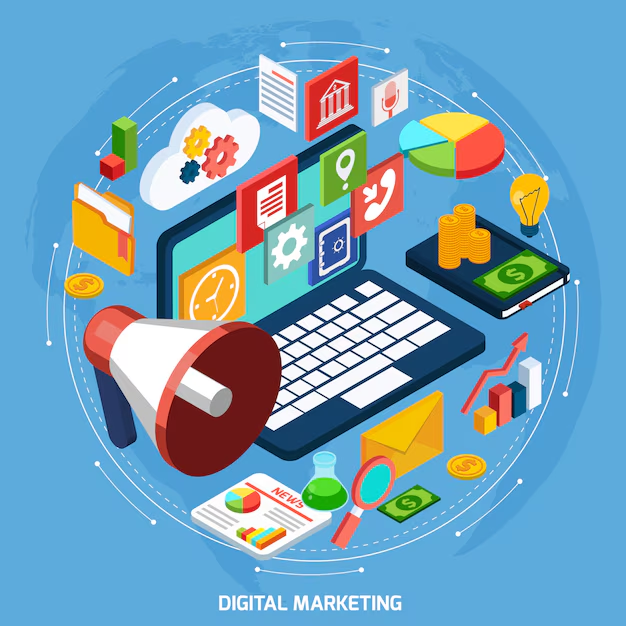
Unlocking the Power of Digital Marketing for Your Business: A Comprehensive Guide
In today’s fast-paced world, traditional methods of marketing are quickly being overshadowed by digital strategies that offer far-reaching impact and measurable results. For businesses in the USA, harnessing the power of digital marketing is no longer optional but essential. Whether you’re a startup, a small business, or a large corporation, digital marketing can provide the tools and information you need to thrive in a competitive marketplace. This guide will walk you through the fundamentals of digital marketing, the key strategies used, and how to leverage these techniques to grow your business.
Understanding Digital Marketing
Digital marketing encompasses a variety of strategies and tactics aimed at promoting products or services using digital channels. Unlike traditional marketing, which relies on print, radio, and TV ads, digital marketing leverages online platforms such as social media, search engines, email, and websites. The primary goal is to connect with the target audience where they spend most of their time:
Key Components of Digital Marketing

1. Search Engine Optimization (SEO): SEO is the practice of optimizing your website to rank higher in search engine results pages (SERPs). By targeting relevant keywords, improving site structure, and creating high-quality content, businesses can increase their visibility and attract more organic traffic.
2. Content Marketing: Content is key in the digital world. Creating valuable, relevant, and engaging content can help establish your brand as an authority in your industry. This includes blog posts, articles, , videos, and more. Content marketing not only drives traffic but also builds trust and fosters customer relationships.
3. Social Media Marketing: Social media platforms like Facebook, Instagram, Twitter, LinkedIn, and TikTok provide powerful tools to connect with your audience. Effective social media marketing involves creating and sharing content that resonates with your audience, running targeted ads, and engaging with followers to build a community around your brand.
4. Email Marketing: One of the oldest digital marketing channels, email marketing remains highly effective. Building a strong email list and sending personalized, value-driven messages can lead to higher conversion rates and customer retention.
5. Pay-Per-Click Advertising (PPC): PPC advertising allows businesses to bid for ad placements in search engine results or on social media platforms. You pay each time a user clicks on your ad. This method provides immediate visibility and can be highly targeted based on demographics, interests, and search behavior.
6. Affiliate Marketing: Affiliate marketing involves partnering with individuals or companies who promote your products or services in exchange for a commission on sales. This strategy leverages the reach and influence of affiliates to boost traffic and sales.
7. Analytics and Data Analysis; One of the biggest benefits of digital marketing is the ability to track and analyze data. Tools like Google Analytics provide information about user behavior, campaign performance, and ROI, allowing businesses to make data-driven decisions and refine their strategies.
Developing a Digital Marketing Strategy
To use digital marketing effectively, businesses need a well-thought-out strategy. Here’s a step-by-step approach to developing it:
1. Determine your goals; What do you want to achieve with digital marketing? Goals may include increasing brand awareness, generating leads, increasing sales, or improving customer retention. Clear goals help guide your strategy and measure success.
2. Understand your audience: It’s important to know your target audience. Conduct market research to identify demographics, preferences, and online behaviors. This information will help you create content and campaigns that resonate with your audience.
3. Choose the right channels: Based on your audience research, choose the digital marketing channels that will be most effective for reaching your target market. Different channels serve different purposes, so tailor your choice to your goals and audience preferences.
4. Create a content plan: Create a content calendar that outlines what content you will produce and when. Make sure your content is diverse, including blog posts, social media updates, videos, and more. Focus on providing valueable & solving problems for your audience.
5. Implement and monitor: Launch your campaigns and continuously monitor their performance. Use analytics tools to track metrics like traffic, engagement, conversions, and ROIAdjust your strategies based on data to improve results.
6.Optimize and iterate: Digital marketing is dynamic and requires constant optimization. Review your campaigns regularly, test new approaches, and refine your strategies to stay ahead of the competition and meet your goals.

And refine your strategies to stay ahead of the competition and meet your goals.
Best Practices for Digital Marketing Success
Focus on user experience: Make sure your website and content provide a seamless experience for users. Fast load times, mobile optimization, and easy navigation are key factors to keeping visitors engaged and reducing bounce rates.
Invest in quality content: High-quality content that is informative, entertaining, and relevant will resonate more with your audience and encourage sharing. Invest time and resources in creating content.
Leverage social proof: Customer reviews, testimonials, and case studies can build trust and credibility. Showcase positive feedback and success stories to impress potential customers and enhance your brand reputation.
Personalize your approach: Tailor your marketing efforts to individual preferences and behaviors. Personalized emails, targeted ads, and customized content can significantly increase engagement and conversions.
Stay updated with trends: The digital marketing landscape is constantly evolving. Stay informed about the latest trends, tools, and best practices to keep your strategies effective and relevant.
Build and maintain relationships: Engage with your audience regularly and respond to their feedback. Building strong relationships with customers increases loyalty and can lead to long-term success.